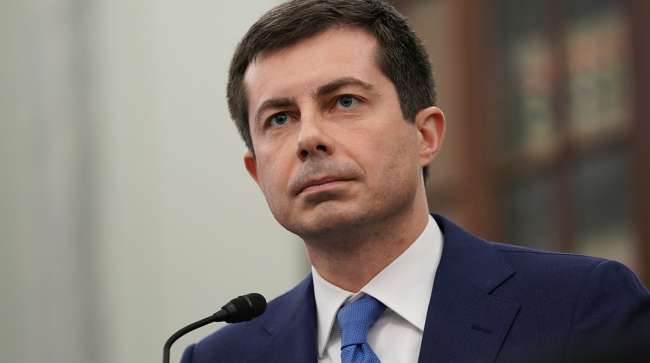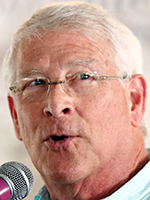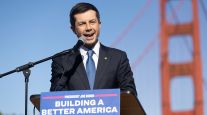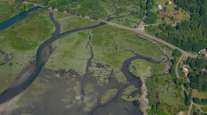Senior Reporter
Safety, Infrastructure Top Buttigieg’s Agenda at Senate Hearing

[Stay on top of transportation news: Get TTNews in your inbox.]
President Joe Biden’s nominee to head the Department of Transportation pointed to the importance of safely moving people and goods and the new administration’s goal of modernizing the nation’s mobility networks as key areas of focus for him during his Jan. 21 Senate nomination hearing.
“I believe that good transportation policy can play no less a role than making possible the American dream, getting people and goods to where they need to be, directly and indirectly creating good-paying jobs,” said Pete Buttigieg, the former South Bend, Ind., mayor and presidential aspirant who, if confirmed, would guide Biden’s infrastructure vision.
The Biden team intends to unveil a multitrillion-dollar infrastructure proposal that would cover the spectrum of transportation matters. A plan for funding such a proposal was not outlined by Buttigieg during the hearing before the Senate Commerce Committee.
Buttigieg Testimony by Transport Topics on Scribd
However, Buttigieg pointed to his transportation policy history at the municipal level — which includes promoting multimodal access, advancing economic initiatives and alleviating traffic congestion to boost connectivity along freight and commuter hubs — as experience that would help him steer that vision.
“I worked with regional and state partners, and across the aisle, to support enhancements to our inter-city train system and our now-international airport, and we pioneered public-private partnerships like ‘Commuters Trust,’ a benefits program to improve the city’s transportation experience for workers,” he said.
Buttigieg has championed the Biden White House’s $1.9 trillion COVID-19 economic aid package that would dedicate $20 billion for hard-hit transit operations. Biden’s plan proposes relief for transit agencies to assist with upgrades and connectivity improvements.
WATCH LIVE: The Committee convenes a hearing to consider @PeteButtigieg to be secretary of the @USDOT.
Click to watch: https://t.co/jh3ZfL1qnB — Senate Commerce (@SenateCommerce) January 21, 2021
According to the plan, the country’s public transit systems are “critical for a robust and equitable economy recovery. This relief will keep agencies from laying off transit workers and cutting the routes that essential workers rely on every day while making these transit systems more resilient and ensuring that communities of color maintain the access to opportunity that public transportation provides.”
The day before the hearing, Buttigieg said, “What we’re going to see over the next few hours and over the next few days is aggressive action, looking to the future to make the American people better off, starting with that COVID[-19] rescue package that’s about defeating the virus and building our economy back better.”
Responding to concerns raised by senators, the nominee committed to review safety programs in the freight industry, enhance rural broadband, facilitate management of electric and autonomous vehicles, empower the workforce via growth in the construction sector, and evaluate potential impediments to a massive tunnel project between New York and New Jersey.
In a questionnaire provided to the committee, Buttigieg emphasized the possibility for cooperation between Congress and the Biden White House to “deliver bold, transformative infrastructure plans.”
In signaling support for Buttigieg’s nomination, most of the senators on the panel pointed to his political acumen, municipal record and academic pedigree. The nominee earned degrees from Harvard and Oxford universities.

Wicker
“As a former local elected official, he will bring a valuable perspective to the Department of Transportation regarding the transportation infrastructure needs and challenges of towns and cities throughout our country,” said Sen. Roger Wicker (R-Miss.), who presided as chairman of the committee. Democrats, now in control of the chamber, will announce Wicker’s successor as early as this month.
For their part, congressional transportation leaders said they anticipate considering macro-scale infrastructure policies aimed at advancing technological advancements, as well as severe-weather resilience across vulnerable sites. Also on the congressional radar is the task of updating a federal surface transportation law that expires in September. The approval of big-picture infrastructure and highway policy legislation requires a funding plan.
A vote on Buttigieg’s nomination has not been scheduled. If confirmed, he would succeed former Secretary Elaine Chao.
Support for Buttigieg’s confirmation is solid. Myriad sectors endorsed his nomination, emphasizing optimism for realizing lasting funding policies for freight corridors and passenger-centric systems.
U.S. Chamber of Commerce President Suzanne Clark observed: “Addressing America’s transportation infrastructure is a shared responsibility between federal, state and local governments. Mr. Buttigieg has firsthand knowledge of that relationship and would bring those insights to improve the coordination and outcomes on improving America’s transportation networks.”
“Buttigieg’s bold ambitions to invest in infrastructure as a means to reinvigorate a pandemic-stricken economy, create jobs and restore our nation’s deteriorating roads and bridges make clear his commitment to forward-leaning solutions to longstanding problems,” said American Trucking Associations President Chris Spear. “A well-maintained and reliable transportation network is crucial to the delivery of the nation’s freight and vital to our country’s economic and social well-being.”
Want more news? Listen to today's daily briefing:
Subscribe: Apple Podcasts | Spotify | Amazon Alexa | Google Assistant | More




